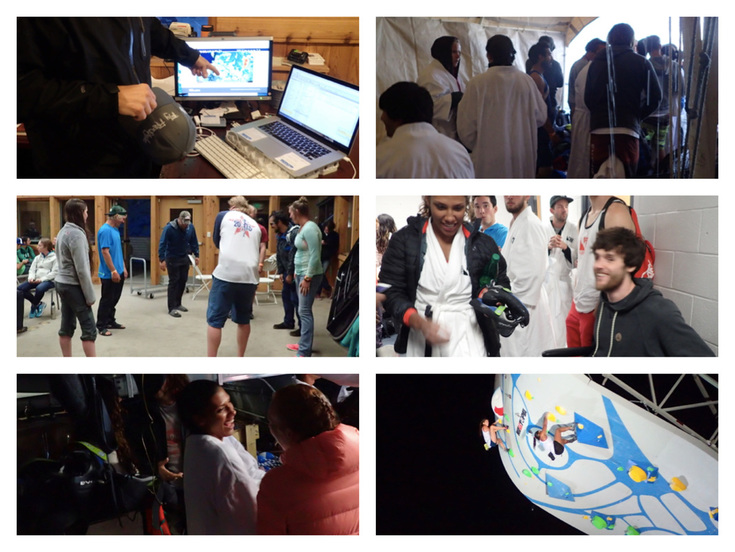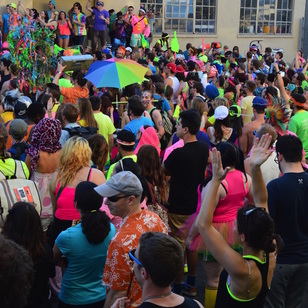 Image courtesy of Portland Timbers YouTube channel.
Image courtesy of Portland Timbers YouTube channel. Standing on a rain-beaten stage at Providence Park facing thousands of fans celebrating the Portland Timbers’ first MLS Championship victory, Coach Caleb Porter’s inspiring words rang loud and true: "Life. Life is about memories and moments…and every once in a while a little bit of magic…and no one can take it away from us." I couldn’t agree more.
Experiences are more valuable than materials, psychologists discovered in 2003.1 This fact stuck with me like gum on the bottom of my mind. First a seed of understanding, which then grew into the very meaning and purpose that would define my life's path.
Behavioral economics was a hot topic in 2009 when I graduated from college, implications magnified with the onset of the recession. News outlets like CNN, Forbes, The Atlantic, The Huffington Post, and The Wall Street Journal were all tantalized by this new basis for consumer decision making that Leaf Van Boven and Thomas Gilovich, and later Ryan Howell and Graham Hill, had proven. And I, a millennial, was very much shaped by these new trends.
Why are experiences more valuable than things?
The most compelling argument I found in favor of experiences’ value addresses the truth about its actual psychological duration.
An experience lasts more than a night at a show or a weekend on the beach. There’s the time before an experience that brings us much anticipation and excitement as our imagination runs wild with the possibilities (hard to do with products because you already know what you’re getting).4 There’s the time during the experience that gives us an increased sense of vitality and fulfillment.3 Lastly, there’s the memories and the stories we tell after the experience that can stay with us for life. Even if something went wrong, at least it makes for a good story.1
Discussing this topic with friends, I have often heard the rebuttal, “but most experiences wouldn’t be possible without stuff, so aren't things like climbing shoes actually more valuable because they allow for experiences?” Exactly, these materials provide the most satisfaction when associated with the experiences that they allow. Framing our material purchases in this way – emphasis on the experience vs. the thing – can help combat the negative feelings like buyer’s remorse that sometimes come with material purchases.
Experiences are more valuable than materials, psychologists discovered in 2003.1 This fact stuck with me like gum on the bottom of my mind. First a seed of understanding, which then grew into the very meaning and purpose that would define my life's path.
Behavioral economics was a hot topic in 2009 when I graduated from college, implications magnified with the onset of the recession. News outlets like CNN, Forbes, The Atlantic, The Huffington Post, and The Wall Street Journal were all tantalized by this new basis for consumer decision making that Leaf Van Boven and Thomas Gilovich, and later Ryan Howell and Graham Hill, had proven. And I, a millennial, was very much shaped by these new trends.
Why are experiences more valuable than things?
- Experiences are often shared while materials are generally enjoyed alone, filling our innate social tank and need for companionship.2 It’s the reason you’re more likely to go see Star Wars: The Force Awakens for the second time with a friend who hasn’t seen it rather than spend the afternoon home alone, surrounded by all your stuff.
- Experiences are less susceptible to comparison, which therefore limits buyer’s remorse, jealousy, and anxiety – all negative feelings that often result from product purchases.3 Hard to regret partying in Phuket even after hearing about your friend’s backpacking trip to Machu Picchu.
- Experiences contribute in a greater way toward our sense of identity – what makes you, you.1 While the new iPhone 6s you got for Christmas is exciting, people tend to be way more interested in scrolling through photos of your 10-year high school reunion or hearing about that time you dropped it in the toilet (no wonder Apple’s marketing is so effective).
The most compelling argument I found in favor of experiences’ value addresses the truth about its actual psychological duration.
An experience lasts more than a night at a show or a weekend on the beach. There’s the time before an experience that brings us much anticipation and excitement as our imagination runs wild with the possibilities (hard to do with products because you already know what you’re getting).4 There’s the time during the experience that gives us an increased sense of vitality and fulfillment.3 Lastly, there’s the memories and the stories we tell after the experience that can stay with us for life. Even if something went wrong, at least it makes for a good story.1
Discussing this topic with friends, I have often heard the rebuttal, “but most experiences wouldn’t be possible without stuff, so aren't things like climbing shoes actually more valuable because they allow for experiences?” Exactly, these materials provide the most satisfaction when associated with the experiences that they allow. Framing our material purchases in this way – emphasis on the experience vs. the thing – can help combat the negative feelings like buyer’s remorse that sometimes come with material purchases.
What does "value" mean?
While value is often associated with monetary worth, we scratch at the deeper meanings of value – usefulness, importance, meaningfulness – when we look beyond dollar signs to the full value of an experience. It’s easy to think this computer that has lasted me seven years was a good deal, but the psychological truth is that experiences, though intangible, are far better at cultivating happiness,5 and that is the real meaning behind value.
Bingo. Happiness.
“Happiness is the meaning of life,” the Dalai Lama answers simply in his bestselling book, The Art of Happiness. That age-old question answered in one simple word. Happiness has been proven to contribute toward productivity, health, and strong relationships. Economists measure the health of a society based on happiness levels. The positive ramifications of happiness are endless.
We can be robbed, a natural disaster can strike and we can lose all our earthly possessions, but we’ll always have our experiences. Experiences not only stick with us but memories and stories have the ability to evolve. Materials, on the other hand, remain frozen in time. We get used to things and that excitement of a big purchase wears off.6 Experiences slip naturally into a higher truth that Western society unfortunately spends so much effort fighting: that nothing is permanent and change is inevitable.
“We are the sum of all the moments of our lives.”7
When it comes down to it, I started Mandell Experiences to create and spread happiness in the best way I saw possible (and love doing). And that is what this blog is all about – sharing my experiences, helping others create them, and hopefully inspiring thousands more to optexperiences.
While value is often associated with monetary worth, we scratch at the deeper meanings of value – usefulness, importance, meaningfulness – when we look beyond dollar signs to the full value of an experience. It’s easy to think this computer that has lasted me seven years was a good deal, but the psychological truth is that experiences, though intangible, are far better at cultivating happiness,5 and that is the real meaning behind value.
Bingo. Happiness.
“Happiness is the meaning of life,” the Dalai Lama answers simply in his bestselling book, The Art of Happiness. That age-old question answered in one simple word. Happiness has been proven to contribute toward productivity, health, and strong relationships. Economists measure the health of a society based on happiness levels. The positive ramifications of happiness are endless.
We can be robbed, a natural disaster can strike and we can lose all our earthly possessions, but we’ll always have our experiences. Experiences not only stick with us but memories and stories have the ability to evolve. Materials, on the other hand, remain frozen in time. We get used to things and that excitement of a big purchase wears off.6 Experiences slip naturally into a higher truth that Western society unfortunately spends so much effort fighting: that nothing is permanent and change is inevitable.
“We are the sum of all the moments of our lives.”7
When it comes down to it, I started Mandell Experiences to create and spread happiness in the best way I saw possible (and love doing). And that is what this blog is all about – sharing my experiences, helping others create them, and hopefully inspiring thousands more to optexperiences.
Thank you for taking the time to read Mandell Experiences’ first blog post. We encourage you to subscribe by clicking the button on the right, “Optblog,” to receive notifications when new pieces are posted.
___
1. Leaf Van Boven and Thomas Gilovich, “To Do or to Have? That Is the Question,” Journal of Personality and Social Psychology (December 2003).
2. Peter Caprariello and Harry Reis, “To do, to have, or to share? Valuing experiences over material possessions depends on the involvement of others,” Journal of Personality and Social Psychology (February 2013).
3. Ryan T. Howell and Graham Hill, “The mediators of experiential purchases: Determining the impact of psychological needs satisfaction and social comparison,” The Journal of Positive Psychology (November 2009).
4. Amit Kumar, Matthew A. Killingsworth, and Thomas Gilovich, “Waiting for Merlot: anticipatory consumption of experiential and material purchases,” Physiological Science (June 2014).
5. Paulina Pchelina & Ryan T. Howell, “The hidden cost of value-seeking: People do not accurately forecast the economic benefits of experiential purchases,” The Journal of Positive Psychology (February 2014).
6. Christina Armenta, Katherine Jacobs Bao, Sonja Lyubomirsky and Kennon M. Sheldon, “Is Lasting Change Possible? Lessons from the Hedonic Adaptation Prevention Model,” in Stability of Happiness (July 2014).
7. Thomas Wolfe, Look Homeward, Angel (1929).
Thank you for taking the time to read Mandell Experiences’ first blog post. We encourage you to subscribe by clicking the button on the right, “Optblog,” to receive notifications when new pieces are posted.
___
1. Leaf Van Boven and Thomas Gilovich, “To Do or to Have? That Is the Question,” Journal of Personality and Social Psychology (December 2003).
2. Peter Caprariello and Harry Reis, “To do, to have, or to share? Valuing experiences over material possessions depends on the involvement of others,” Journal of Personality and Social Psychology (February 2013).
3. Ryan T. Howell and Graham Hill, “The mediators of experiential purchases: Determining the impact of psychological needs satisfaction and social comparison,” The Journal of Positive Psychology (November 2009).
4. Amit Kumar, Matthew A. Killingsworth, and Thomas Gilovich, “Waiting for Merlot: anticipatory consumption of experiential and material purchases,” Physiological Science (June 2014).
5. Paulina Pchelina & Ryan T. Howell, “The hidden cost of value-seeking: People do not accurately forecast the economic benefits of experiential purchases,” The Journal of Positive Psychology (February 2014).
6. Christina Armenta, Katherine Jacobs Bao, Sonja Lyubomirsky and Kennon M. Sheldon, “Is Lasting Change Possible? Lessons from the Hedonic Adaptation Prevention Model,” in Stability of Happiness (July 2014).
7. Thomas Wolfe, Look Homeward, Angel (1929).



 RSS Feed
RSS Feed